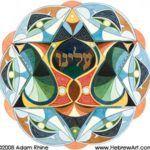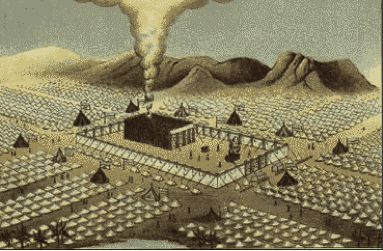The “Aleinu”

www.hebrewart.com
The Special Prayer called “Aleinu”.
There is a special prayer in the Siddur called the “Aleinu” which means, “it is our duty”. It is actually one of the very oldest prayers and is found at the conclusion of every prayer service. Early sources say the “Aleinu”, as a dedication of faith, was actually composed by Joshua after he led Israel across the Jordan into the Promised Land. Eventually the prayer became part of the daily service. It was said, that this prayer pointed to the Oneness of God and His kingship, and expressed the belief that all humanity would accept Him as the only God.
The “Aleinu” contains excerpts from Isaiah 30 and Isaiah 45 in which it says, “There is no other God besides me, a just God and a Savior; …that to me every knee will bow and every tongue will swear about me that only in Adonai are justice and strength”. The “Aleinu” further speaks of the conviction that He will one day remove detestable idolatry from the earth.
It is significant that this prayer is part of the letter to the Philippians. Philippians 2:10 tells us, “that in honor of the name given Yeshua, every knee will bow in heaven, on earth and under the earth – every tongue will acknowledge that Yeshua the Messiah is Lord”. The “Aleinu” would have been quite familiar to a first century Jewish audience and it would have been obvious that Rav Sha’ul (Paul) was quoting from this prayer.
The “Aleinu” was also a favorite prayer of the Jewish martyrs. In fact, those martyrs, during the Middle Ages, made use of the “Aleinu” as their dying song. During the persecution of Jews in Blois, France, in 1171 CE they were accused of murdering a Christian child during Passover. As a result many masters of the Torah were massacred at this time. The death of these saints was accompanied by a solemn song resounding thru the stillness of the night causing those who heard to wonder at the melodious strains, which they had never heard. It was ascertained afterwards that the martyred saints had made use of the “Aleinu”.
One eyewitness account sent to Rabbi Jacob of Orleans, read in part:
"When the flames blazed and licked the bodies of the victims, they raised their voices in a unison melody; at first it was a low chant and afterwards a high-sounding melody. The people [Gentiles] came and said: 'Which of your songs is this? For we have never heard such a melody from you before.' Yet we knew it very well, for it was the chant of the Aleinu."
So what was Rav Sha’ul (Paul) communicating to his “Gentile” audience about the Messiah? The pre-existence of the Messiah was a familiar concept in rabbinic Judaism and so Paul was not drawing on Christian themes but on ancient Hebrew understanding. From a Hebrew perspective, this prayer looked to the unity of mankind under the Kingship of God. It was a firm proclamation of the Divine Unity of God. Yeshua, who was the ultimate Jewish martyr, died for the sins of all mankind in order to bring that unity and restoration, and the fulfillment of God as the supreme King of the Universe.
Consider adding this special prayer to your daily prayer time. One of the benefits of this prayer was to reveal the difference between Israel’s relationship with God and the view of God the surrounding nation’s exhibited. Let us answer the call to be set apart.




Thank you so much for your study on the “Aleinu Prayer”. I have been studying this prayer in the Siddur and other writings. There is so much that the “Church” is missing by not studying these prayers. As I read them, I feel so uplifted and close to God, I can see why the Jews constantly read these prayers on a daily basis. We should also make it a practice to do so. Blessings, Bobby
Glad to hear it Bobby. It is truly a wonderful prayer.
Todah Dr Dye;
for this Alienu connection to Shaul, 1st Century believers and the Renewed Covenant teachings.
I was so excited when I saw that connection. The aleinu was one of my favorite prayers as a child. I loved the melody.
where can I hear a melody…I can read the prayer, but haven’t access to a synagogue where it might be heard?
JoAnne – the melody has changed over the centuries and we don’t exactly know how it sounded in the time of martyrdom of the Jews in Blois France. I would suggest going on youtube and type in “aleinu l’shtabeach” and see what comes up. There will most likely be a variety of tunes. I think the Maccabeats have one out.